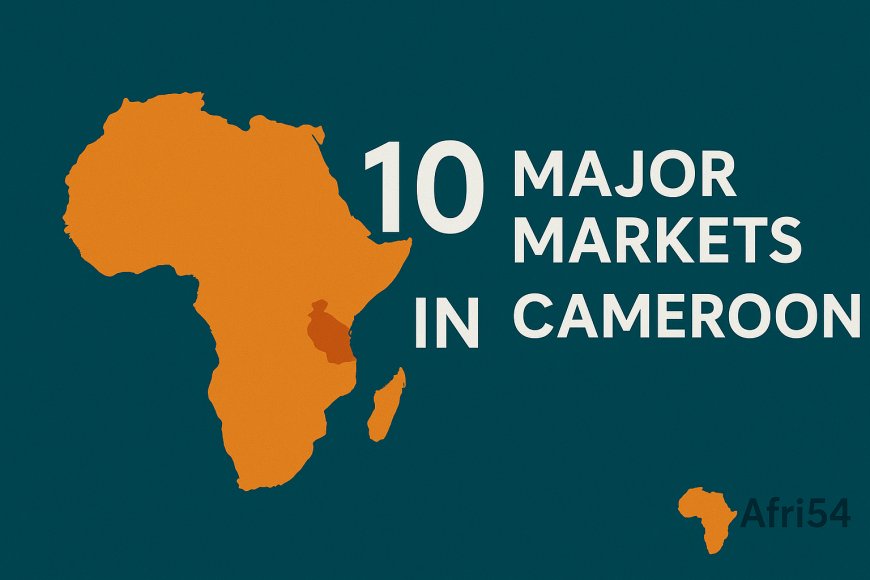10 Major Markets in Cameroon
Discover the 10 major markets in Cameroon, from Yaoundé’s Marché Central to Maroua’s cultural hub. Explore Cameroon’s diverse economy, agriculture, crafts, and vibrant trade culture.


Reading Time: ~8 minutes
Cameroon, often referred to as “Africa in Miniature” due to its cultural and geographical diversity, boasts some of the most bustling markets in Central Africa. These markets are not just trading centers—they are melting pots of culture, tradition, and commerce, where locals and visitors converge to exchange goods and experiences. From agricultural produce to textiles, handicrafts, electronics, and spices, Cameroon’s markets are full of life and variety.
Here are the 10 major markets in Cameroon that define its economic and cultural landscape.
The Central Market in Yaoundé is one of the largest and busiest markets in Cameroon. It offers clothing, electronics, foodstuffs, spices, and handicrafts. Its central location makes it a hub for both locals and visitors.
Located in Cameroon’s economic capital, this market is a commercial powerhouse. Traders sell imported goods, textiles, seafood, electronics, and local produce, serving as a vital economic hub in the city.
Mokolo Market is famous for its affordable clothing, shoes, secondhand items, and everyday essentials. It is one of the largest open-air markets in Yaoundé and caters to thousands daily.
This bustling market is known for textiles, fashion items, electronics, and imported goods. It is also a hotspot for local street food and vibrant urban life.
The biggest market in northwestern Cameroon, Bamenda Main Market specializes in agricultural produce, textiles, and household items. It is central to the economic activity of the English-speaking region.
Often called the “food basket market,” Kumba Market is known for its agricultural produce, cocoa, palm oil, and fresh farm goods. It is essential to trade in southwestern Cameroon.
Located in northern Cameroon, this market reflects Sahelian trade culture. It offers livestock, cereals, fabrics, and handicrafts, connecting traders from Cameroon, Nigeria, and Chad.
The economic hub of western Cameroon, Bafoussam Market is famous for coffee, textiles, household goods, and agricultural produce. It attracts traders from the Grassfields region.
In the Far North region, Maroua Central Market is a cultural gem. It offers handwoven mats, leather goods, spices, and livestock, showcasing traditional craftsmanship.
Situated in southern Cameroon, Ebolowa Market is known for cocoa, plantains, vegetables, and traditional foods. It plays a crucial role in the agribusiness economy of the South Region.
Cameroon’s markets are the backbone of its economy and culture. They connect rural producers to urban consumers, sustain cross-border trade, and serve as spaces where traditions and modern commerce blend seamlessly. For visitors, these markets are the best places to experience authentic Cameroonian culture.
From the lively Marché Central in Yaoundé to the traditional Maroua Market in the Far North, Cameroon’s markets are a testament to the country’s diversity. They highlight not only the strength of local trade but also the cultural richness that makes Cameroon truly unique.
Have you listed your business on Afri54?
Afri54 exists to solve a fundamental challenge faced by millions of African businesses: lack of visibility. Whether you're an automobile part seller in Lagos, a local attire manufacturer in Kigali, a coffee exporter in Addis Ababa, or a mobile phone supplier in Accra, you deserve to be seen. Join Now
 Like
0
Like
0
 Dislike
0
Dislike
0
 Love
0
Love
0
 Funny
0
Funny
0
 Angry
0
Angry
0
 Sad
0
Sad
0
 Wow
0
Wow
0
Afri54 Sep 19, 2025 0 40
Afri54 Sep 23, 2025 0 27
Afri54 Sep 23, 2025 1 24
Afri54 Sep 23, 2025 1 24
Afri54 Sep 22, 2025 0 23
Afri54 Sep 24, 2025 0 3
Afri54 Sep 24, 2025 0 6
Afri54 Sep 23, 2025 1 5
Afri54 Sep 23, 2025 0 8
Afri54 Sep 23, 2025 0 1
Total Vote: 3
Rebecca Enonchong (Cameroon – AppsTech)
Total Vote: 3
Startup Pitch Competition
Total Vote: 3
Mobile Money & Fintech
Total Vote: 3
Blogs & Articles
Total Vote: 3
Aliko Dangote (Nigeria – Dangote Group)
Total Vote: 4
Fintech
Total Vote: 3
Access to funding
Total Vote: 2
Lagos, Nigeria
Total Vote: 3
Silas Adekunle (Nigeria – Robotics)
Total Vote: 3
Technology & Innovation
Total Vote: 2
Iyinoluwa Aboyeji (Nigeria – Andela & Flutterwave)



